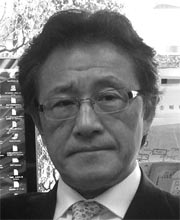Orthomolecular Medicine Hall of Fame
Inducted 2011Founder of the Japanese Society for Orthomolecular Medicine
Tsuyoshi (Ken) Kitahara was born in Tokyo and graduated from the University of Keio, Faculty of Law. As an international businessman he has lived in the United States, Europe, Singapore and Japan. His keen interest in integrative medicine led him to a few medical doctors in Japan who were frustrated with the current system of medicine and who wished to investigate diet and the orthomolecular approach.
In 2001, Ken needed psychiatric help for his son. When told that his son would never get well and would have to take drugs for the rest of his life, Ken decided this was not acceptable. He found one of Dr Abram Hoffer’s articles on vitamin therapies for psychiatric disorders, which provided hope for patients and families. After sending one e-mail to Dr Hoffer, Ken’s whole world changed. With his son, he visited Dr Hoffer in Victoria in 2002, where he received immediate support that he had not found in Japan. Dr Hoffer kindly explained what the original problem was and how to advance the treatment. Ken decided that the benefit and the blessing received from Dr. Hoffer should be available to all people suffering from these problems in Japan.
In 2003 Ken established the Japanese Society for Orthomolecular Medicine (JSOM) along with D. Hiroyuki Abe and Dr Osamu Mizukami. The JSOM focuses on orthomolecular treatment for psychiatric illness, autism and various stress-related disorders. The JSOM hosts three research and study meetings per year for medical doctors, as well as several orthomolecular seminars for patients and their families. In addition, Dr Michael Lesser’s Brain Chemistry Diet, Dr Joan Larson’s Depression Free Naturally, and Harold Foster’s What Really Causes Schizophrenia, have been published in Japanese with Ken’s assistance. He has attended the Orthomolecular Medicine Today Conference for the past eight years.
It is always a great joy when patients improve and in JSOM’s and Ken’s office, five former schizophrenic patients are working and performing various office tasks. His next goal is to open a group home where orthomolecular therapy will be at the core of living to assist the patients and to provide meaningful work.
Today, Ken still feels his most important duty is to spread information on the orthomolecular approach, which has been established by our pioneers, and to maintain and lead an active movement forward for the sake of those in need.



